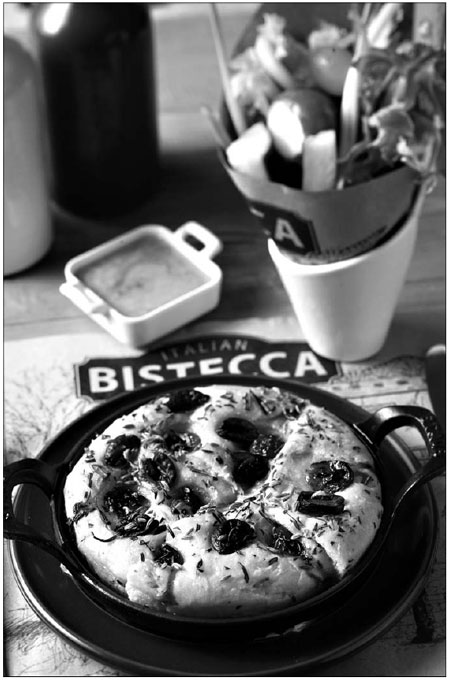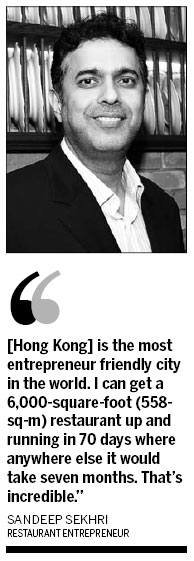For global gourmets
 |
|
Sekhri celebrated the launch of a cookbook by offering guests a delicious platter of foccacia. To his customers, however, he serves a choice of international dining options from 12 different cuisines. Dining Concepts / for China Daily |

Sandeep Sekhri exploits opportunities in Hong Kong by offering an international platter of food and beverage choices. Rebecca Lo finds out what motivates him.
Sandeep Sekhri is very good at shaking hands. He puts this talent to practice on a Thursday night in Lan Kwai Fong, at a cookbook launch held at his Florentine steakhouse Bistecca.
Along with director of culinary operations Christopher Mark and cookbook co-author Andrew Sun, the warm and personable Delhi native welcomes parade of customers eager to show their support while feasting on herb and fruit focaccia, Tuscan cured meats and pan-fried shiitake mushrooms.
A week later in his office on Hollywood Road, Sekhri is preparing for the opening of Al Molo, a 160-seat restaurant featuring the talents of New York City-based celebrity chef Michael White. At the same time, he is packing to accompany his 18-year-old son abroad after the youth was accepted into several Ivy League colleges.
It was his children's tuition fees that originally propelled the entrepreneur to establish his first venture, Bombay Dreams, in 2002.
Arriving in Hong Kong at the age of 24 after training at Delhi's Institute of Hotel Management and with a few years of restaurant experience under his belt, he was hired as the Harilela Group's manager for Viceroy, an established Indian restaurant in Wanchai. The year was 1990.
He opened seven more restaurants for the group and became a partner in 1995 before splitting to start Bombay Dreams. Six months later, SARS hit Hong Kong and the bottom fell out of the city's food and beverage industry.
"I had no real vision, really!" insists Sekhri, referring to the two dozen or so restaurants and related businesses that he currently runs. "Bombay Dreams was for survival. I had to keep paying my kids' school fees. Then, the opportunities kept coming. I took a lot of risks. Nine times out of 10, my gamble paid off."
With the cheap rents in Hong Kong's Soho district available during SARS, Sekhri was able to pick up some good spaces at rock-bottom prices. Soho Spice was the first of seven restaurants he opened between 2003 and 2007 - Sekhri was one of the pioneers of the area's hot dining and wining scene, as he transformed former local da pai dang or street stalls into fine dining establishments.
In 2007, with the opening of The Venetian Macao, Sekhri ventured into the former Portuguese enclave. He soon found that it was like the Wild West cowboy town in comparison to Hong Kong.
"There was literally no rule of law or licensing procedures," he recalls. "Food and entertainment were not on most people's priority list, and Macao was beginning to take up too much of my time."
So he sold one of his two outlets and regrouped in Hong Kong with a couple of restaurants in Elements, the high-end shopping mall above Kowloon station.
In the last 18 months, he has opened 10 restaurants, with one of the latest being Argentine steakhouse Tango in the space that Bombay Dreams used to occupy.
"Bombay Dreams needed to be refreshed after almost a decade, so we moved it upstairs within the same building," he notes.
As Hong Kong's only dining group with 12 expatriate chefs overseeing 12 different cuisines, Sekhri believes that he owes much of his success to Hong Kong itself.
"There is no other place in the world which offers such a level playing field," he states. "It is the most entrepreneur friendly city in the world. I can get a 6,000-square-foot (558 sq m) restaurant up and running in 70 days where anywhere else it would take seven months. That's incredible. I feel very lucky to be here and to be able to grow a restaurant group so rapidly in just eight years."
He sees the next round of expansion taking place in southern China, and is carefully studying the market there to see how Dining Concepts can add to the Pearl River Delta culinary scene. But he still has plans for Hong Kong.
"I can do another 10 restaurants here," he says. "We focus on being consistent. Value for money is important. People come back for the food and experience. If we can keep doing that, and make each experience better than the last, then word of mouth will do the rest."
















